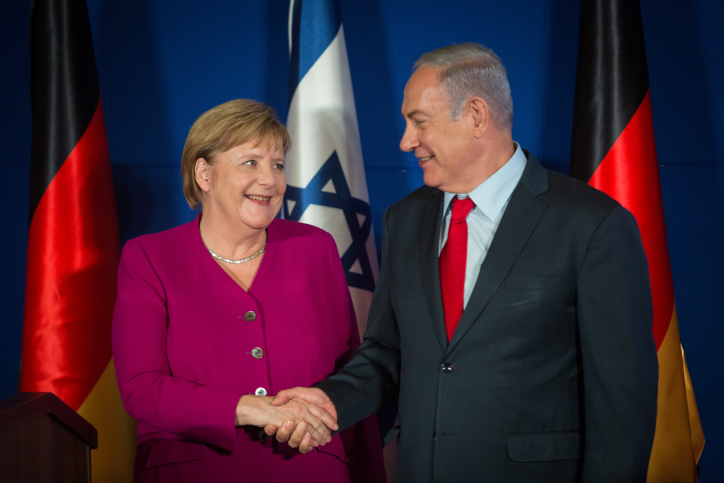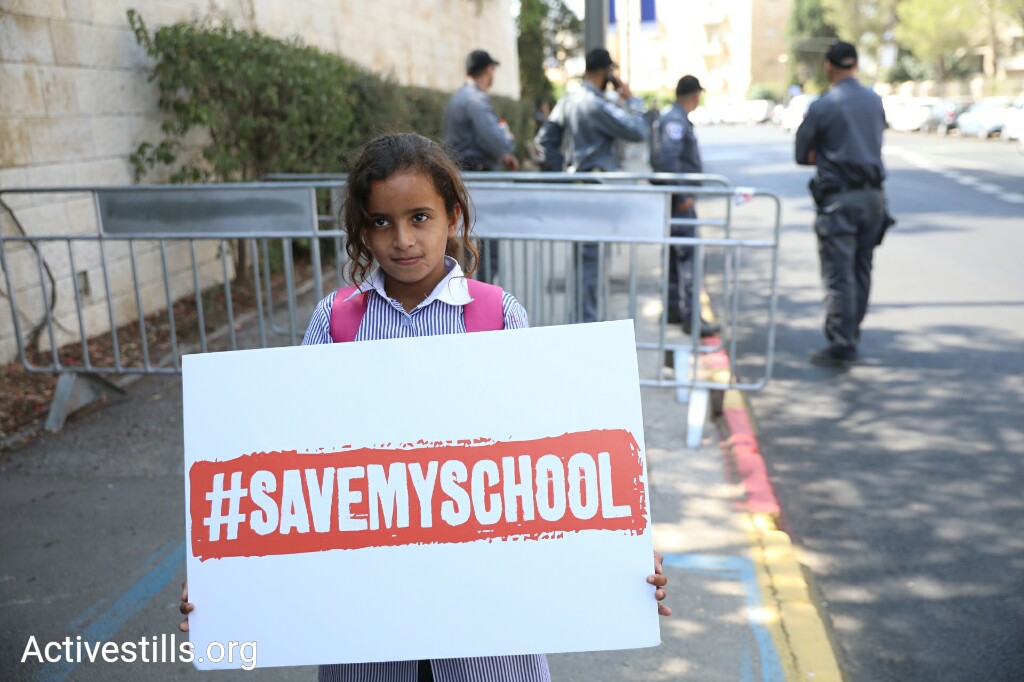The residents of Khan al-Ahmar had hoped the German chancellor would demand Netanyahu back down from the imminent demolition of their hamlet. Instead, she called the matter an ‘Israeli decision.’
By Oren Ziv

Ever since Israel’s High Court of Justice gave its final stamp of approval to the demolition of the village of Khan al-Ahmar last month, residents and solidarity activists have been hoping that international pressure, especially from Europe, would delay or prevent the demolition. The activists have directed their efforts toward convincing members of the EU Parliament to openly oppose the move. They also hoped that the threat of punitive measures by European states could have some influence on Israel.
At the protest tent in Khan al-Ahmar, built in the courtyard of the village school, the worn out activists and journalists who have been taking turns sleeping in the village in recent weeks waited with bated breath for German Chancellor Angela Merkel’s visit. The widespread assumption was that Israel would not dare demolish the village during her trip to Israel, with rumors swirling that the chancellor threatened to cancel her trip should the village be destroyed.
Merkel’s visit indeed provided some clarity regarding the possibility of German pressure on Israel on Khan al-Ahmar, and from the perspective of the villagers, things seem gloomy.
In a meeting with university students at the Israel Museum in Jerusalem Thursday, Merkel was asked about her opinion on Khan al-Ahmar, and whether there was any truth to the rumors about her potentially cancelling her trip. “Time and again it was claimed that we conditioned our trip on this. We never spoke about this in government. This information came to us from Israel, that we might not travel, and that is absolutely false. This is an Israeli decision.” Merkel’s remarks appeared to be in line with the Israeli government, which insists that foreign countries should not intervene in matters relating to the occupation.
“Our visit has nothing to do with this,” Merkel added. “One can disagree on it, about the settlement policy, and I definitely have some critical remarks to make because I believe in the two-state solution, but that is not relevant here. We are two democracies and we can exchange different political opinions, also with the prime minister.”
Merkel’s press conference alongside Prime Minister Benjamin Netanyahu later that day only seemed to strengthen her remarks. Netanyahu appeared comfortable and self-assured, joking with the journalists and photographers who covered the event at the King David Hotel. Merkel did not speak about Khan al-Ahmar, while Netanyahu answered one question about the differences between the two leaders on the Palestinian issue, stating that “we generally agree on most things, and we disagree on some things. So what?”
Eid Jahalin, the spokesperson for Khan al-Ahmar, said last week that he was happy with the support he received from members of the EU Parliament, many of whom have visited the village over the past few weeks. “We need them to put more pressure on Israel so that we can save our village,” he told me. While Merkel states her support for two states, Eid described the demolition of Khan al-Ahmar as being “like a bullet in the head of the two-state solution.”
While Merkel met with President Rivlin on Thursday afternoon, dozens of students from Khan al-Ahmar’s famed eco-school demonstrated outside the presidential residence, dressed in school uniforms and holding signs asking the chancellor to intervene in the demolition.

“Merkel needs to do something, not just talk,” said activist Angela Godrey-Goldstein, who accompanied the children to the president’s home. “We can still save the school and allow a fair life for the Bedouin.” Godrey-Goldstein, however, remains optimistic: “The question is what happened off the record in the closed-room meeting between Netanyahu and Merkel. They are on thin ice. Because of the history, Merkel is uncomfortable with publicly criticizing Netanyahu, but I hope that in their meeting she told him that the situation cannot go on like this.”
The fact that the village hasn’t yet been destroyed — despite the fact that a month has passed since the Supreme Court approved the demolition — may be attributed to the Jewish holidays and Merkel’s visit. Beginning next week, however, there is nothing stopping the Israeli authorities from demolishing Khan al-Ahmar and evicting its 170 residents.
This article was first published in Hebrew on Local Call. Read it here.

